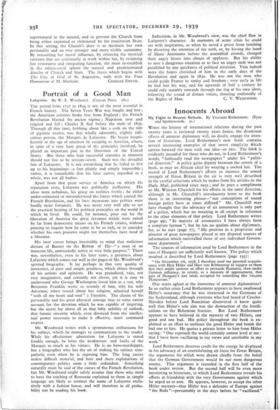Portrait of a Good Man
Lafayette. By W. E. Woodward. (Cresset Press. 18s.)
THE period from 1757 to 1834 is one of the most eventful in French history. The Seven Years War was fought and lost ; the American colonies broke free from England ; the French Revolution blasted the ancien regime ; Napoleon rose and reigned and fell ; Charles X fled before the mob of 183o. Through all this time, bobbing about like a cork on the tide of gigantic events, was that wholly admirable, slightly ridi- culous person, the Marquis de Lafayette. He began magni- ficently at the age of nineteen by escaping to America, where, in spite of a very hazy grasp of the principles involved, he played an important part in the liberation of the United States. But those who lead successful crusades at nineteen should not live to be seventy-seven. Such was the dreadful fate of Lafayette. It is not astonishing that he failed to live up to his beginnings—a feat plainly and simply impossible ; rather, it is remarkable that his later career, regarded as a whole, was not all bathos.
Apart from that great service to America on which his reputation rests, Lafayette was politically ineffective. His ideas were nebulous, his grasp on realities feeble ; he either under-estimated or misunderstood the forces which caused the French Revolution, and his later incursions into politics were hardly more fortunate. He was never very well able to see the practical bearing of his political principles on the world in which he lived. He could, for instance, pour out for the liberation of America the great revenues which were raised by far from democratic means on his French estates, without pausing to inquire how he came to be so rich, or to consider whether his own peasants might not themselves have need of a liberator.
His later career brings irresistibly to mind that malicious dictum of Burnet on the Bishop of Ely—" a man of an innocent life, unwcariedly active to very little purpose." There was, nevertheless, even in his later years, a greatness about Lafayette which comes out well in the pages of Mr. Woodward's spirited biography. It lay perhaps in that very quality of innocence, of pure and simple goodness, which shines through all his actions and opinions. He was prejudiced, vain, not very imaginative, and certainly not clever, yet it is easy to understand why George Washington loved him as a son, why Benjamin Franklin wrote so warmly of him, why his wife Adrienne, when teased about her religion, admitted herself " with all my heart and soul " a Fayettist. The charm of his personality and his great physical courage may to some extent account for the devotion which he was capable of inspiring, but the secret lay above all in that lofty nobility of outlook, that fanatic sincerity which, even divorced from the intellec- tual power necessary to make it effective, must command respect.
Mr. Woodward writes with a spontaneous enthusiasm for his subject, which he manages to communicate to the reader. While his affectionate admiration for Lafayette is stated frankly enough, he loves the weaknesses and faults of the Marquis as much as his virtues. He is no hero-worshipper, but a biographer who has the art of making his subject sym- pathetic even when he is exposing him. The long career makes difficult material, and here and there explanations of contemporary politics seem a little redundant. Something naturally must be said of the causes of the French Revolution, but Mr. Woodward might safely assume that those who need to have the teaching of Rousseau explained to them in simple language are likely to connect the name of Lafayette exclu- sively with a fashion house, and will therefore in all proba- bility not be reading his book. Indecision, in Mr. Woodward's view, was the chief flaw in Lafayette's character. At moments of acute crisis he could act with inspiration, as when he saved a priest from lynching by diverting the attention of the mob, or, by kissing the hand of Marie Antoinette before the assembled crowds, changed their angry hisses into shouts of applause. But his ability to save a dangerous situation or to face an angry mob was not paralleled by any quickness of political intuition. Vain indeed were the hopes cherished of him in the early days of the Revolution and again in 183o. He was not the man who could guide France to sanity and freedom ; very early in life he had lost his way, and for upwards of half a century he could only stumble onwards through the fog of his own ideas, following the sound of distant voices, shouting confusedly of






























 Previous page
Previous page